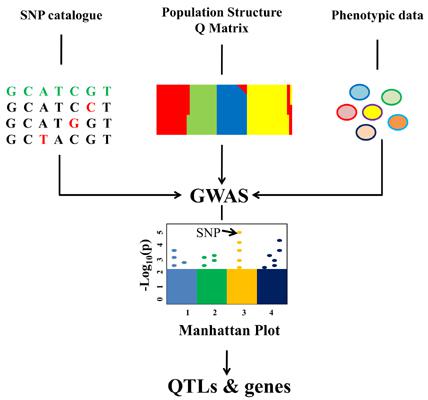当前位置:
X-MOL 学术
›
Curr. Genomics
›
论文详情
Our official English website, www.x-mol.net, welcomes your feedback! (Note: you will need to create a separate account there.)
Plant-microbe Interactions for Sustainable Agriculture in Post-genomic Era
Current Genomics ( IF 2.6 ) Pub Date : 2020-07-10 , DOI: 10.2174/1389202921999200505082116 Raj Kishan Agrahari 1 , Prashantee Singh 2 , Hiroyuki Koyama 1 , Sanjib Kumar Panda 3
Current Genomics ( IF 2.6 ) Pub Date : 2020-07-10 , DOI: 10.2174/1389202921999200505082116 Raj Kishan Agrahari 1 , Prashantee Singh 2 , Hiroyuki Koyama 1 , Sanjib Kumar Panda 3
Affiliation

|
Plant-microbe interactions are both symbiotic and antagonistic, and the knowledge of both these interactions is equally important for the progress of agricultural practice and produce. This review gives an insight into the recent advances that have been made in the plant-microbe interaction study in the post-genomic era and the application of those for enhancing agricultural production. Adoption of next-generation sequencing (NGS) and marker assisted selection of resistant genes in plants, equipped with cloning and recombination techniques, has progressed the techniques for the development of resistant plant varieties by leaps and bounds. Genome-wide association studies (GWAS) of both plants and microbes have made the selection of desirable traits in plants and manipulation of the genomes of both plants and microbes effortless and less time-consuming. Stress tolerance in plants has been shown to be accentuated by association of certain microorganisms with the plant, the study and application of the same have helped develop stress-resistant varieties of crops. Beneficial microbes associated with plants are being extensively used for the development of microbial consortia that can be applied directly to the plants or the soil. Next-generation sequencing approaches have made it possible to identify the function of microbes associated in the plant microbiome that are both culturable and non-culturable, thus opening up new doors and possibilities for the use of these huge resources of microbes that can have a potential impact on agriculture.
中文翻译:

后基因组时代可持续农业的植物-微生物相互作用
植物与微生物的相互作用既是共生的又是对抗的,对这两种相互作用的了解对于农业实践和生产的进步同样重要。这篇综述深入了解了后基因组时代植物-微生物相互作用研究的最新进展以及这些研究在提高农业生产方面的应用。新一代测序(NGS)和标记辅助选择植物抗病基因,配备克隆和重组技术,使抗病植物品种开发技术突飞猛进。植物和微生物的全基因组关联研究 (GWAS) 使得选择植物所需的性状以及操作植物和微生物的基因组变得轻松且耗时更少。某些微生物与植物的结合已被证明可以增强植物的胁迫耐受性,同样的研究和应用有助于开发抗胁迫的作物品种。与植物相关的有益微生物正被广泛用于开发可直接应用于植物或土壤的微生物菌群。新一代测序方法使鉴定植物微生物组中可培养和不可培养微生物的功能成为可能,
更新日期:2020-07-10
中文翻译:

后基因组时代可持续农业的植物-微生物相互作用
植物与微生物的相互作用既是共生的又是对抗的,对这两种相互作用的了解对于农业实践和生产的进步同样重要。这篇综述深入了解了后基因组时代植物-微生物相互作用研究的最新进展以及这些研究在提高农业生产方面的应用。新一代测序(NGS)和标记辅助选择植物抗病基因,配备克隆和重组技术,使抗病植物品种开发技术突飞猛进。植物和微生物的全基因组关联研究 (GWAS) 使得选择植物所需的性状以及操作植物和微生物的基因组变得轻松且耗时更少。某些微生物与植物的结合已被证明可以增强植物的胁迫耐受性,同样的研究和应用有助于开发抗胁迫的作物品种。与植物相关的有益微生物正被广泛用于开发可直接应用于植物或土壤的微生物菌群。新一代测序方法使鉴定植物微生物组中可培养和不可培养微生物的功能成为可能,


























 京公网安备 11010802027423号
京公网安备 11010802027423号